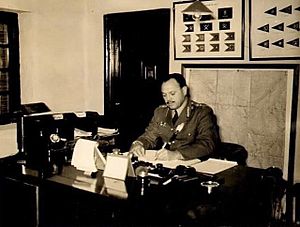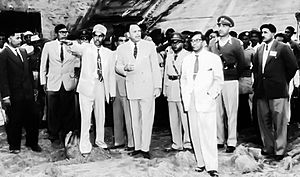Muhammad Ayub Khan facts for kids
Quick facts for kids
Field Marshal
Muhammad Ayub Khan
|
|
|---|---|
|
محمد ایوب خان
|
|
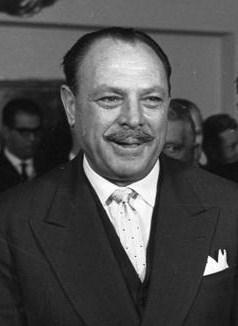
Khan in West Germany in 1961
|
|
| 2nd President of Pakistan | |
| In office 27 October 1958 – 25 March 1969 |
|
| Preceded by | Iskandar Ali Mirza |
| Succeeded by | Yahya Khan |
| 4th Minister of Defense | |
| In office 28 October 1958 – 21 October 1966 |
|
| Deputy | Federal Secretary Defence See list
Muhammad Khurshid (1958–1959)
S. Fida Hussain (1959–61) Nazir Ahmed (1961–65) |
| Preceded by | Ayub Khuhro |
| Succeeded by | V-Adm. Afzal Rahman Khan |
| In office 24 October 1954 – 11 August 1955 |
|
| Prime Minister | Mohammad Ali Bogra |
| Deputy | Akhter Husain (Defence Secretary) |
| Preceded by | Mohammad Ali Bogra |
| Succeeded by | Mohammad Ali |
| Minister of Interior | |
| In office 23 March 1965 – 17 August 1965 |
|
| Deputy | Interior Secretary |
| Preceded by | K. H. Khan |
| Succeeded by | Ali Akbar Khan |
| 3rd Commander-in-Chief of the Pakistan Army | |
| In office 23 January 1951 – 26 October 1958 |
|
| President | Iskander Mirza |
| Governor General |
|
| Prime Minister | |
| Deputy | Chief of General Staff See list
Maj-Gen. Yusuf Khan (1951–53)
Maj-Gen. M. H. Din (1953–55) Maj-Gen. Sher Khan (1955–57) Maj-Gen. Yahya Khan (1957–58) |
| Preceded by | Douglas Gracey |
| Succeeded by | Musa Khan |
| Chief Martial Law Administrator | |
| In office 7 October 1958 – 27 October 1958 |
|
| President | Iskander Mirza |
| Preceded by | Feroz Khan Noon |
| Succeeded by | Nurul Amin (1971) |
| Personal details | |
| Born | 14 May 1907 Rehana, North-West Frontier Province, British India (Now, Khyber Pakhtunkhwa, Pakistan) |
| Died | 19 April 1974 (aged 66) Islamabad, Pakistan |
| Resting place | Rehana, Haripur, Khyber Pakhtunkhwa, Pakistan |
| Nationality |
|
| Political party | Convention Muslim League (before 1974) |
| Other political affiliations |
Pakistan Muslim League (1962) |
| Children | 2, including Gohar Ayub Khan |
| Cabinet | Ministry of Talents |
| Civilian awards |
|
| Military service | |
| Branch/service | |
| Years of service | 1928–1958 |
| Rank | |
| Unit | 15th Punjab Regiment |
| Commands |
|
| Battles/wars |
|
| Military awards |
|
Muhammad Ayub Khan (born May 14, 1907 – died April 19, 1974) was a Pakistani military leader and politician. He served as the second President of Pakistan from 1958 to 1969. Before becoming president, he was the third commander-in-chief of the Pakistan Army from 1951 to 1958.
Born in the North-West Frontier Province, Ayub Khan studied at Aligarh Muslim University. He also trained at the Royal Military College in Sandhurst, England. He fought for the British against Japan in World War II. After Pakistan became independent in 1947, he joined the Pakistan Army. In 1951, he became the first Pakistani commander-in-chief of the army.
From 1953 to 1958, he was a minister in the government, serving as Defence and Home Minister. In 1958, he supported President Iskandar Ali Mirza in declaring martial law (military rule). Just two weeks later, Ayub Khan took over the presidency in a military takeover. This was the first successful military coup in Pakistan's history.
As president, Ayub Khan focused on developing Pakistan's economy and infrastructure. He also made Pakistan a strong ally of the United States. This led to better relations with the US but worsened ties with the Soviet Union. In 1965, he launched a military operation against India, which led to a major war. The war ended in a peace agreement.
Ayub Khan's time as president is often called the "Decade of Development." He is praised for economic growth and building industries. However, he is also criticized for increasing the military's role in politics. Critics also say his policies led to wealth being concentrated in a few hands. His actions are also seen by some as contributing to the later conflict that led to Bangladesh's independence.
Contents
Early Life and Education
Ayub Khan was born on May 14, 1907, in Rehana. This village is in what was then the North-West Frontier Province of British India. Today, it is part of Khyber Pakhtunkhwa, Pakistan. His family spoke the Hindko language and belonged to the Tareen tribe.
His father, Mir Dad Khan, was a military officer in the British Indian Army. Ayub Khan started his schooling in Sarai Saleh and later moved to Haripur. He then went to Aligarh Muslim University (AMU) for college. While there, he was accepted into the Royal Military College in Sandhurst, England. He left AMU to train in Great Britain. Ayub Khan could speak Urdu, Pashto, English, and his local Hindko dialect.
Military Career
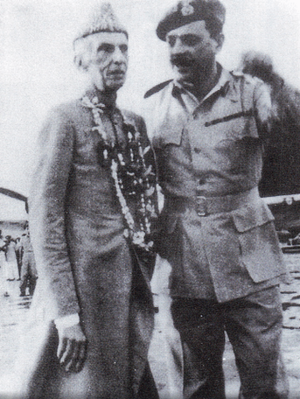
Ayub Khan began his military training at Sandhurst in July 1926. He became a 2nd Lt. in the British Indian Army in February 1928. He was part of the 1/14th Punjab Regiment. One of his classmates was Joyanto Nath Chaudhuri, who later became the army chief of India.
He was promoted to lieutenant in 1930 and captain in 1937. During World War II, he became a temporary lieutenant-colonel in 1942. He served in Burma during the Burma Campaign. Later, he was promoted to temporary colonel and commanded his own regiment.
In 1946, he returned to British India. In 1947, he became a brigadier. When British India was divided into India and Pakistan, he chose to join the Pakistan Army. He was one of the most senior officers to do so.
In 1948, he commanded the 14th Infantry Division in Dacca, East Pakistan. In 1949, he received the Hilal-i-Jurat award for his service. He was then called to the General Headquarters as the Adjutant General of the army.
Becoming Commander-in-Chief
In 1951, the Pakistani government decided to appoint Pakistani officers as commanders-in-chief. General Sir Douglas Gracey, a British officer, left his command. Several senior Pakistani officers were considered for the top army job.
However, the Defence Secretary, Iskandar Mirza, played a key role. He argued for promoting the most junior Major-General, Ayub Khan. Ayub Khan was seen as less ambitious and more loyal to the civilian government. So, on January 17, 1951, Prime Minister Liaquat Ali Khan appointed Ayub Khan as the first Pakistani commander-in-chief of the Pakistan Army.
Ayub Khan's appointment changed the military's tradition. It marked the end of British officers leading the Pakistani armed forces. He also helped Vice-Admiral M.S. Choudhri become the first Pakistani navy commander in 1953. Ayub Khan also worked to strengthen military ties with the United States.
Cabinet Minister
In 1954, Ayub Khan became the defence minister in Prime Minister Muhammad Ali Bogra's government. He also served as home minister. Ayub Khan believed that politicians were causing too much chaos. He wanted to protect the armed forces from political interference. He also aimed to unite the provinces of West Pakistan into one unit.
The "One Unit Scheme" combined the four western provinces into West Pakistan. This was done to balance the larger population of East Bengal, which was renamed East Pakistan. While Punjab supported this, other provinces protested. East Bengal especially saw it as unfair.
Ayub Khan continued to serve as Defence Minister under different prime ministers. He kept close ties with Iskander Mirza, who became the first President in 1956. In 1957, President Mirza promoted Ayub Khan to the full rank of general.
Presidency (1958–1969)
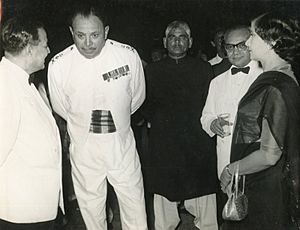
Political instability grew in Pakistan. Prime Ministers resigned one after another. On October 7, 1958, President Iskander Mirza cancelled the Constitution. He declared martial law and appointed General Ayub Khan as the chief martial law administrator.
Ayub Khan said he took power to end the "chaotic conditions" and restore a stable government. He quickly cracked down on smuggling and corruption. This gained him support from ordinary people. However, President Mirza soon wanted to replace Ayub Khan. Ayub Khan, with support from other military leaders, sent Mirza into exile in England.
Ayub Khan's government aimed to bring widespread reforms. He wanted to centralize power and provide faster justice. He also planned to control population growth and develop agriculture. He promised to restore democracy that people could understand.
In 1960, a public vote was held asking, "Do you have confidence in Muhammad Ayub Khan?" A large majority voted yes. This led to a new presidential system of government. Ayub Khan was elected president for five years. In July 1961, he made his first state visit to the United States.
Constitutional and Legal Changes
A special commission was set up to create a new Constitution. Ayub Khan, however, changed the recommendations to fit his own views. The new Constitution was passed in 1962. It respected Islam but did not declare it the state religion.
The president was to be elected by 80,000 (later 120,000) "Basic Democrats." These individuals were largely under the president's influence. Ayub Khan compared this system to the American Electoral College. He also allowed a National Assembly, but it had limited powers.
In 1961, he signed the "Muslim Family Laws" bill. This law made it harder for men to have multiple wives without their current wife's consent. It also made divorce more structured.
Economy and Development
Ayub Khan's era is known for significant industrial growth and rural development. He built modern national highways. His focus on capitalism and foreign direct investment led to a period called the "Great Decade." During this time, the private sector was encouraged to build industries. This created many new jobs and boosted the economy.
He oversaw large projects like Mangla Dam and other dams and power stations. He also approved plans for nuclear power plants in Karachi and Dhaka. Pakistan's space program was also started under his rule. The country launched its first uncrewed space mission by 1962.
Education reforms were also carried out, and many new universities and schools were built. He introduced agricultural reforms to limit land ownership. An oil refinery was also established in Karachi. These changes led to a significant increase in the country's GNP. However, critics noted that much of this wealth ended up with a small group of elite families.
Defence Spending
During Ayub Khan's time, Pakistan's military acquired modern weapons from the United States. These included tanks, fighter jets, and a submarine. He also started Pakistan's space program in cooperation with the air force.
Ayub Khan directed Pakistan's nuclear technology efforts towards generating electricity. He spent a lot of money on civilian nuclear power plants and training engineers. He also increased the size of the army and maintained high military spending. This increased the military's influence in government.
Foreign Policy
Alliance with the U.S.
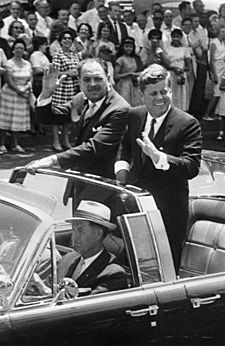
Ayub Khan's foreign policy focused on strong relations with the United States and Europe. He had good support from US President Dwight Eisenhower. Pakistan formed a military alliance with the US against communism in the region.
The Central Intelligence Agency (CIA) used Peshawar Air Station in Pakistan for spy missions over the Soviet Union. Ayub Khan was aware of these activities. In 1960, a US spy plane flying from Peshawar was shot down over the USSR. This caused anger in the Soviet Union. Soviet leader Nikita Khrushchev even threatened to bomb Peshawar. Ayub Khan had to apologize to the Soviet Union.
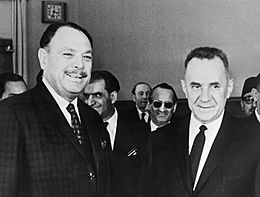
Ayub Khan then worked to reduce tensions with the Soviet Union. He invited Soviet leaders to visit Pakistan. In 1963, he signed a historic border agreement with China, despite US objections.
Relations with the US became less strong from 1961 to 1965. US Presidents John F. Kennedy and Lyndon B. Johnson sought closer ties with India. During the 1965 war, President Johnson placed an embargo on both Pakistan and India. Relations with the Soviet Union improved, and they helped broker a peace treaty between Pakistan and India in 1965.
India and the 1965 War
In 1959, Ayub Khan suggested a joint defense plan with India. This was during border clashes between China and India. However, India's Prime Minister Jawaharlal Nehru was not interested. In 1960, Ayub Khan and Nehru signed the Indus Waters Treaty, which was about sharing river waters.
In 1965, Ayub Khan launched a military operation called Operation Gibraltar in Kashmir. This led to a full-scale war with India. The war ended in a stalemate. A peace agreement, the Tashkent Declaration, was signed in the Soviet Union. Many Pakistanis felt that Ayub Khan had given up too much in the agreement. This led to his Foreign Minister, Zulfiqar Ali Bhutto, resigning and becoming a strong opponent.
Some officials believed that Bhutto's strong anti-India stance had pushed Pakistan towards war. The war caused economic difficulties for Pakistan. The US, Pakistan's main ally, did not support the war and stopped aid. This caused Pakistan to lose a lot of money. Ayub Khan's presidency could not recover politically after the 1965 war. He resigned in March 1969, handing power to Army Commander General Yahya Khan.
Afghanistan Relations
In the 1950s, due to border disputes, Ayub Khan and the Royal family of Afghanistan discussed a plan to merge Afghanistan with Pakistan. This "Afghanistan-Pakistan Confederation Plan" was based on mutual distrust of India and the Soviet Union. However, this plan never happened.
1965 Presidential Election
In 1964, Ayub Khan felt confident about his popularity and called for presidential elections in 1965. He was nominated by the Pakistan Muslim League. He was surprised when Fatima Jinnah, the sister of Pakistan's founder, was nominated by the opposition parties.
Fatima Jinnah gained much support, especially in Karachi and Lahore. She criticized Ayub Khan's policies, including the Indus Waters Treaty and Pakistan's reliance on the United States. During the elections, there were concerns about fairness. Ayub Khan won the election through the Electoral College vote. Fatima Jinnah won the popular vote.
It was reported that the elections were widely disputed by state authorities. Many believed that if the elections had been direct, Fatima Jinnah would have won. The Electoral College had only 80,000 Basic Democrats, who were seen as easily influenced. This election was the first time intelligence agencies were accused of interfering directly in national politics.
Nationwide Protests and Resignation (1969)
Ayub Khan's disputed victory in the 1965 election and the outcome of the war with India severely damaged his image. After returning from Tashkent, Foreign Minister Bhutto publicly criticized Ayub Khan. This led to Bhutto's removal from office. Public anger against Ayub Khan grew in Karachi.
In 1967, Zulfikar Ali Bhutto formed the Pakistan Peoples Party (PPP). He traveled across the country, criticizing Ayub Khan's policies. When Bhutto was arrested, protests erupted. In East Pakistan, the Awami League accused Ayub Khan's government of unfair policies. Labor unions called for strikes. By late 1968, many middle-class people were unhappy.
When faced with the Six Point movement in East Pakistan and criticism from Bhutto's party, Ayub Khan imprisoned both leaders. This only made things worse. Left-wing parties and conservative groups began calling for a parliamentary democracy system.
In 1968, Ayub Khan survived an assassination attempt in Dacca. In 1969, he tried to negotiate with opposition parties. However, these talks failed. Strong protests demanding his resignation spread across the country. Ayub Khan also suffered a heart attack and later a paralysis attack, which affected his ability to govern.
The police struggled to maintain order, especially in East Pakistan, where serious riots occurred. The prices of basic food items like sugar and wheat also increased, leading to more public anger. People used harsh words against Ayub Khan in protests and media.
Some parts of the military began to support the opposition. On March 25, 1969, President Ayub Khan resigned. He invited army commander General Yahya Khan to take control of the country.
Death and Legacy
Ayub Khan did not comment on the Bangladesh Liberation War in 1971. He passed away from a heart attack on April 19, 1974, near Islamabad.
Ayub Khan's presidency aligned Pakistan with the American-led military alliance against the Soviet Union. This helped Pakistan develop its economy and build strong ties with the United States. Significant economic aid and trade from the US and Europe led to rapid industrial growth. However, this also led to increased inequality in wealth distribution. After 1965, he became concerned about the US trying to control Pakistan's foreign policy. He wrote a book about this called Friends Not Masters.
The federal capital was moved from Karachi to the new city of Islamabad during his time. His government also signed the Indus Waters Treaty with India to resolve water-sharing disputes. He built a large network of irrigation canals, dams, and power stations. He also supported agriculture and industry with tax benefits. During his rule, the GNP grew significantly. However, economists noted that his policies mainly benefited elite families. In 1968, his government celebrated the "Decade of Development," but mass protests erupted due to the growing gap between the rich and the poor.
Criticism
After 1965, there was growing unrest due to concerns about corruption, favoritism, and limits on free speech and press. The 1965 presidential election, where Ayub Khan faced Fatima Jinnah, was widely disputed. There were allegations of unfairness in the election process.
Ayub Khan is also criticized for not doing enough to address the economic differences between East and West Pakistan. While he was aware of the issues in East Pakistan, his highly centralized government did not fully address their concerns. This contributed to the later conflict that led to Bangladesh's independence. Some historians also argue that his policies laid the groundwork for later religious influences in the army.
Family
Ayub Khan's son, Gohar Ayub Khan, faced criticism regarding family wealth and business connections. Public concerns about the wealth of the President's family grew. These criticisms negatively affected Ayub Khan's public image.
After his death, his descendants became active in national politics. His son Gohar became a Foreign Minister in the 1990s. His grandson, Omar, also served as a Finance Minister. Another grandson, Yousaf, has also been involved in politics.
Awards and Decorations
| Nishan-e-Pakistan
(Order of Pakistan) |
|||
| Hilal-e-Jurat
(Crescent of Courage) |
Hilal-e-Pakistan
(HPk) |
Pakistan Tamgha
(Pakistan Medal) 1947 |
Tamgha-e-Jamhuria
(Republic Commemoration Medal) 1956 |
| Member of the | The Legion of Merit
(Degree of Chief Commander) (US) |
India General Service Medal
(1936) |
1939-1945 Star |
| Burma Star | War Medal | India Service Medal
1939–1945 |
Queen Elizabeth II
Coronation Medal (1953) |
Foreign Decorations
| Foreign Awards | ||
|---|---|---|
| Order of St Michael and St George | ||
| Member of the British Empire (MBE) | ||
| The Legion of Merit (Degree of Chief Commander) | ||
| India General Service Medal (1936) | ||
| 1939-1945 Star | ||
| Burma Star | ||
| War Medal 1939-1945 | ||
| India Service Medal 1939–1945 | ||
| Queen Elizabeth II Coronation Medal | ||
| Knight Grand Commander of the Order of Rama | ||
Honours
National Honours
 Pakistan:
Pakistan:
 Recipient of the Nishan-e-Pakistan (NPk)
Recipient of the Nishan-e-Pakistan (NPk) Recipient of the Hilal-e-Jurat (HJ)
Recipient of the Hilal-e-Jurat (HJ) Recipient of the Hilal-e-Pakistan (HPk)
Recipient of the Hilal-e-Pakistan (HPk)
Commonwealth Honours
 British India:
British India:
 Member of the Most Excellent Order of the British Empire (MBE)
Member of the Most Excellent Order of the British Empire (MBE)
 United Kingdom:
United Kingdom:
 Honorary Knight Grand Cross of the Order of St Michael and St George (GCMG) (1961)
Honorary Knight Grand Cross of the Order of St Michael and St George (GCMG) (1961)
 Malaya:
Malaya:
Books
Ayub Khan wrote or had books based on his speeches and talks.
Authored by Ayub Khan
- Friends Not Masters: A Political Autobiography, Karachi: Oxford University Press, 1967.
- Ideology and Objectives, Rawalpindi: Ferozesons, 1968.
- Agricultural Revolution in Pakistan, Karachi: Rana Tractors & Equipment, 1968.
Edited by Others
- Diaries of Field Marshall Mohammad Ayub Khan, 1966-1972, Karachi: Oxford University Press, 2007. Edited by Craig Baxter.
- Field Marshal Mohammad Ayub Khan: A Selection of Talks and Interviews, 1964-1967, Karachi: Oxford University Press, 2010. Edited by Nadia Ghani.
See Also
 In Spanish: Ayub Khan para niños
In Spanish: Ayub Khan para niños
- Cold War
- Ayub National Park
- Ayub Medical College
 | James Van Der Zee |
 | Alma Thomas |
 | Ellis Wilson |
 | Margaret Taylor-Burroughs |


